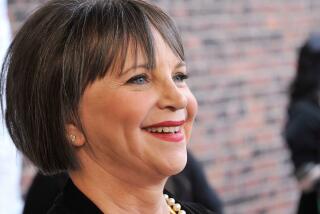Olympian Admits to Steroid Use : Sprinter Reveals She Failed a Drug Test at U.S. Trials in 1984
- Share via
Breaking four years of silence, two-time Olympian Diane Williams said Sunday that she took anabolic steroids before the 1984 Los Angeles Games.
Williams, 28, who finished fourth in the 100 meters at the U.S. Olympic trials in July, 1984, also said in an interview with ABC’s Donna de Varona that she failed a drug test during the trials in the Coliseum.
De Varona said that Williams was introduced to the drugs by her former coach, Chuck Debus of Santa Monica, who has coached many of the United States’ leading female athletes.
Debus on Sunday night denied the allegation, and said: “I am vehemently against the use of all banned substances.”
Williams, who in 1987 was the national champion at 100 meters and finished second at the Pan American Games, was reached in Oviedo, Spain, early Monday morning where she had competed in a meet Sunday. Saying she was in a hurry to make a flight, she did not elaborate on her statements.
The interview, taped earlier, was aired Sunday afternoon at halftime of a college basketball game.
Pat Connolly, Williams’ coach from 1984 to 1988, said the sprinter chose to come forth to ease her conscience and to expose what Connolly termed was a “cover-up” in the drug testing at the ’84 trials.
Williams admits that she failed her drug test at the trials. A United States Olympic Committee official confirmed that but explained that a portion of the test was inconclusive. Therefore, she was not disqualified from the team.
Williams said in the television interview that she “couldn’t live with” the knowledge of her own drug use.
“It has been driving Diane crazy,” Connolly said in a phone interview from Silver Springs, Md. “It is part of the healing process to come out and talk about it. Now she needed to come clean.”
Connolly said Williams came to her in the fall of 1984 after leaving Debus. Williams was competing on the Los Angeles Naturite club coached by Debus. He is a former UCLA and Cal State Northridge track coach.
Connolly said Williams had taken steroids and injections of Human Growth Hormone. HGH is extracted from the pituitary gland of cadavers and used by athletes to promote growth of muscle tissue, often after injury.
Connolly said Williams experienced some side effects from her drug use, for which Williams sought medical treatment.
“It took a year to clean her up,” Connolly said. “But mentally, it took her about three years.”
Connolly said that Williams wanted to speak out to illustrate that athletes can compete successfully without taking drugs.
Connolly said it was especially satisfying when Williams won the 1987 national championship without drugs.
“That was the most thrilling moment as a coach,” she said. “It was just such a tremendous victory. I told them they could do it without drugs.”
Williams grew up in Chicago and attended Michigan State before joining Naturite club in 1982.
Debus said Sunday that last week he sent copies of an international drug-testing proposal that he designed to leaders of The Athletics Congress. The proposal calls for the random international testing of athletes by an independent agency, preferably based in a neutral country such as Switzerland.
“All I can say is that what Diane said is a complete falsehood,” Debus said. “It seems to me that there should be some proof involved before allegations are made.”
Regarding the testing at trials, Williams said in the television interview that she was notified that a first, or A, sample of her urine tested positive.
Dr. Kenneth Clarke, who was then a medical officer with the USOC, told The Times Sunday night that Williams’ A sample tested positive for steroids, but the testing of the B sample proved to be inconclusive.
According to USOC guidelines an athlete is not officially declared to have tested positive unless both samples are found to have banned substances.
Connolly said that Williams’ positive test was suppressed.
“They (officials) protected Diane because there were others,” Connolly said.
She refused to name names but said she hoped the others would come forward now.
More to Read
Go beyond the scoreboard
Get the latest on L.A.'s teams in the daily Sports Report newsletter.
You may occasionally receive promotional content from the Los Angeles Times.







